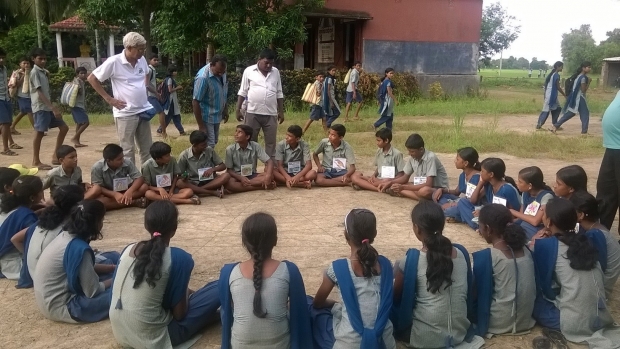Grants :: Small Grant Facilities :: Creating Youth Nature Leaders in Rajnagar, Odisha
Creating Youth Nature Leaders in Rajnagar, Odisha

Students discuss their action projects © ASED/IUCN
Objectives
The objective of the project is to introduce an action-based environmental education program that empowers local youth to take action and involves the community in environmental conservation
Background
Though people living in vulnerable regions are aware of many of the environmental problems surrounding them, they are often not provided with an appropriate platform through which to develop or act on problems that they face. In particular, the educational system and societal attitudes disregard youth as important players and often suppress rather than encourage independent thought and action. Further, though these communities live in close proximity to areas of great ecological importance, they are not encouraged to build positive relationships with the nature around them. Over time, this leads to deep frustration with authorities and resistance to new ideas, and disregards and deemphasizes the importance of local biodiversity and environment around them. It also does not give youth a platform to implement their education, leading to a devaluation of the importance of formal education.
We would provide local youth in the region with a platform by which to constructively plan and execute a conservation project that seems relevant and important to local people in the community. They will be encouraged to think creatively and come up with non-traditional means of problem solving and project management, incorporating techniques that involve the local community in a positive, voluntary spirit. To assist them, they will take part in knowledge development activities and technical skills relating to local environmental problems. Ultimately, we will enhance the capacity of local youth to tackle complex situations and improve their awareness and appreciation for the environment through action projects
Target beneficiaries
We will reach 100 students and four mentor teachers directly through the pilot phase of the program. As each student will communicate with their families and the local community, we expect the project to reach approximately 300 indirect beneficiaries. Similarly, during the scale up phase, we will reach 200 students and eight mentor teachers, with about 600 indirect beneficiaries.
Though our program does not have any explicit livelihood linkages, many skills learned during the program (leadership qualities, project planning and management) are very applicable to a range of livelihoods. We would like to collaborate with any other MFF groups working with people in Rajnagar to introduce students to sustainable livelihoods including alternative farming practices, ecotourism etc.
Outputs
The output of this project will be an action-based environmental education program for Rajnagar District, Odisha
Accomplishments and challenges
Accomplishments:
- Educational resource materials and curriculum developed in English, Bengali and Odiya to enable schools and local organizations in Rajnagar to conduct action based environmental leadership courses.
- Transformational Leadership Training and Project planning workshops conducted with 300 students of six schools.
- Teams of students in each school developed and worked on a six month coastal and marine biodiversity conservation project and also conducted stakeholder engagement workshops to encourage the locals and present their plans for taking the projects forward.
- Students became aware of local biodiversity, environmental issues and basic ecological processes through the use of curriculum materials developed in activity.
- Students got practical experience that encouraged development of leadership and project management skills through conducting action oriented conservation projects which empowered the local community to take ownership of their projects and continue working towards collaborative, environmentally friendly management of natural resources in Rajnagar.
Contributions to cross-cutting themes
A similar program in the Sundarbans has created over 400 young women nature leaders with ASED currently training 200 more girls in the Sundarbans and 100 more in Kolkata.
In this project, gender will be given due consideration through the following measures:
- At least two of the six program staff will be female.
- At least 50% of the project participants will be female, and at least 50% of all leadership roles within the student Green Rhinos Teams will be filled by girl students.
- During all seminars and workshops, trainers and coordinators will ensure that female participants are heard and given the chance to voice their ideas and opinions.
Lessons Learned
- A significant learning of the project is the need for better preparation to support some of the student identified activities. For example, one of the student groups decided that their entire school will plant 100,000 mangrove saplings. Sourcing so many saplings is proving troublesome as the Forest Department is charging INR 15 per sapling and there is no money in the budgets to raise this. In this case saplings will be sourced from the wild, with the help of the forest department guides and from nurseries established through MFF SGF projects with APOWA and Save the Children. Land for the plantations has already been identified by the Forest Department who has agreed to provide support to the students to conduct the activity.
- It is important that the students be taken inside Bhitarkanika mangrove forest to understand the biodiversity and ecosystem services it provides. Despite their close proximity to the forest, most students have not been inside the forest since it is a national park and largely inaccessible to most. The students greatly benefited from the field visit (an activity which was not in the original proposal), which was made possible with support from the Forest Department who provided boats and sent guides to accompany the students.
Project Facts
Country
Location
Rajnagar Block, Kendrapara District, Odisha
Topic
Duration
11th Jul 2016 to 10th Jul 2017
MFF Grant Amount
INR 1,180,400
Co-financing Partner
Nature’s Club, Mahipal, Kendrapara, Odisha
Implementing Partner
Ms. Diti Mookherjee
Association for Social and Environmental Development (ASED)
asedkol@gmail.com